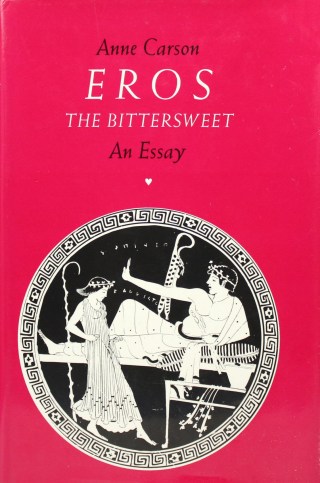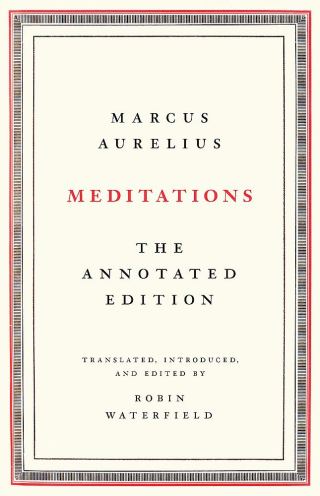and cold sweat holds me and shaking
grips me all, greener than grass
I am and dead — or almost
I seem to me.
Because it touches on one of the most universal human themes, Fragment 31 is one of Sappho’s most translated fragments, which also means the most interpreted — for poetry in translation is an exponent of creation to begin with, but especially when translating the ancient tongue of a bygone civilization from a world alien to our own. At its best, such meta-creation lives up to the Nobel-winning Polish poet Wisława Szymborska’s lovely notion of “that rare miracle when a translation stops being a translation and becomes… a second original.”
Carson’s translation of Fragment 31 began on the pages of her 1986 classic Eros the Bittersweet (public library). In it, she makes the discomposing observation that the poem embodies an internalized inheritance of Ancient Greek culture, which continues to haunt our modern lives: the conception of eros as lack, manifested in our tendency to define love by loss, or anticipatory loss, or the anterograde loss of what has never been had. (We need only look to Proust for the supreme confirmation.) “It is a notion that, once adopted, has a powerful effect on one’s habits and representations of love,” Carson observes, and the modern heart can’t but flinch with recognition.

The ideal is projected on a screen of the actual, in a kind of stereoscopy. The man sits like a god, the poet almost dies: two poles of response within the same desiring mind. Triangulation makes both present at once by a shift of distance, replacing erotic action with a ruse of heart and language. For in this dance the people do not move. Desire moves. Eros is a verb.
A generation later, Tennyson tried his tenderer hand at it:
Jealousy may be the most staggering scale discrepancy of the inner world — an enormous all-consuming emotion pinched into extreme smallness of spirit. It is also one of the most universal human experiences — homily on the elemental tragedy that the ever-open mouth of choice hungers for more than what chance grants us, so that we live desiring more than we have.
He seems to me equal to the gods that man
whoever he is who opposite you
sits and listens close
to your sweet speaking
The triangle, Carson observes, is the platonic form of jealousy and Ancient Greece is its crucible:
But the finest — for its literary splendor, its intellectual elegance, and its psychological insight — comes from a 2002 translation of Sappho’s fragments by the visionary Canadian poet, essayist, classicist, and translator Anne Carson:
Jealousy is a dance in which everyone moves, for it is the instability of the emotional situation that preys upon a jealous lover’s mind.
From this emerges a revelatory revision of this universal emotion:
The word “jealousy” comes from Greek zēlos meaning “zeal” or “fervent pursuit.” It is a hot and corrosive spiritual motion arising in fear and fed on resentment. The jealous lover fears that his beloved prefers someone else, and resents any relationship between the beloved and another. This is an emotion concerned with placement and displacement. The jealous lover covets a particular place in the beloved’s affection and is full of anxiety that another will take it.
We see clearly what shape desire has there: a three-point circuit is visible within Sappho’s mind… Sappho perceives desire by identifying it as a three-part structure… For, where eros is lack, its activation calls for three structural components — lover, beloved and that which comes between them.
This, indeed, is the raw nature of jealousy — beneath the narrative, beyond the magma of feeling, it is a projection, a self-construction, a self-response that reveals more about our relationship to love itself, which springs from our relationship to ourselves, than about any object of desire. Like prayer, of which it is a mutant species, jealousy is a clarifying force for who we are and what we want; like prayer, this clarity is its true substance and object — and not the granting of some private wish, and not some outside agent bending reality to our will.

no: tongue breaks and thin
fire is racing under skin
and in eyes no sight and drumming
fills ears
It is hardly surprising that some of humanity’s finest poets have wielded their original genius at Sappho’s Fragment 31. In the early 1820s, Byron translated it thus:
No one has voiced this hunger with more howling precision than Sappho (c. 630–c. 570 BC) — the Tenth Muse, inventor of the personal lyric, and poet laureate of heartbreak — in one of the few surviving fragments of her poetry.
Paradoxically, Sappho’s fragment illustrates the warp side of jealousy — the refusal to trade places. The poet, observing the besotted girl, is standing deliberately aside, unresentfully fascinated by but unwilling to take the place of the man whom the girl deifies. Carson writes:

Jealousy is beside the point; the normal world of erotic responses is beside the point; praise is beside the point. It is a poem about the lover’s mind in the act of constructing desire for itself. Sappho’s subject is eros as it appears to her; she makes no claim beyond that. A single consciousness represents itself; one mental state is exposed to view.
[…]
Equal to Jove that youth must be —
Greater than Jove he seems to me —
Who, free from Jealousy’s alarms,
Securely views thy matchless charms.
Ah! Lesbia! though ’tis death to me,
I cannot choose but look on thee;
But, at the sight, my senses fly,
I needs must gaze, but, gazing, die;
Whilst trembling with a thousand fears,
Parch’d to the throat my tongue adheres,
My pulse beats quick, my breath heaves short,
My limbs deny their slight support;
Cold dews my pallid face o’erspread,
With deadly languor droops my head,
My ears with tingling echoes ring,
And life itself is on the wing,
My eyes refuse the cheering light,
Their orbs are veil’d in starless night:
Such pangs my nature sinks beneath,
And feels a temporary death.
I watch thy grace; and in its place
My heart a charmed slumber keeps,
While I muse upon thy face;
And a languid fire creeps
Thro’ my veins to all my frame,
Dissolvingly and slowly: soon
From thy rose-red lips my name
Floweth; and then, as in a swoon,
With dinning sound my ears are rife,
My tremulous tongue faltereth,
I lose my color, I lose my breath,
I drink the cup of a costly death,
Brimm’d with delirious draughts of warmest life.
I die with my delight, before
I hear what I would hear from thee.
Considering the extraordinary subtlety and force of Sappho’s conception of jealousy as the “triangulation of desire” between the three human agents in the poem — the girl, the object of her desire, and the poet looking in on the scene — she writes:
Considering the extraordinary subtlety and force of Sappho’s conception of jealousy as the “triangulation of desire” between the three human agents in the poem — the girl, the object of her desire, and the poet looking in on the scene — she writes:
and lovely laughing — oh it
puts the heart in my chest on wings
for when I look at you, even a moment, no speaking
is left in me
It is not a poem about the three of them as individuals, but about the geometrical figure formed by their perception of one another, and the gaps in that perception. It is an image of the distances between them. Thin lines of force coordinate the three of them. Along one line travels the girl’s voice and laughter to a man who listens closely. A second tangent connects the girl to the poet. Between the eye of the poet and the listening man crackles a third current. The figure is a triangle.
[…]





